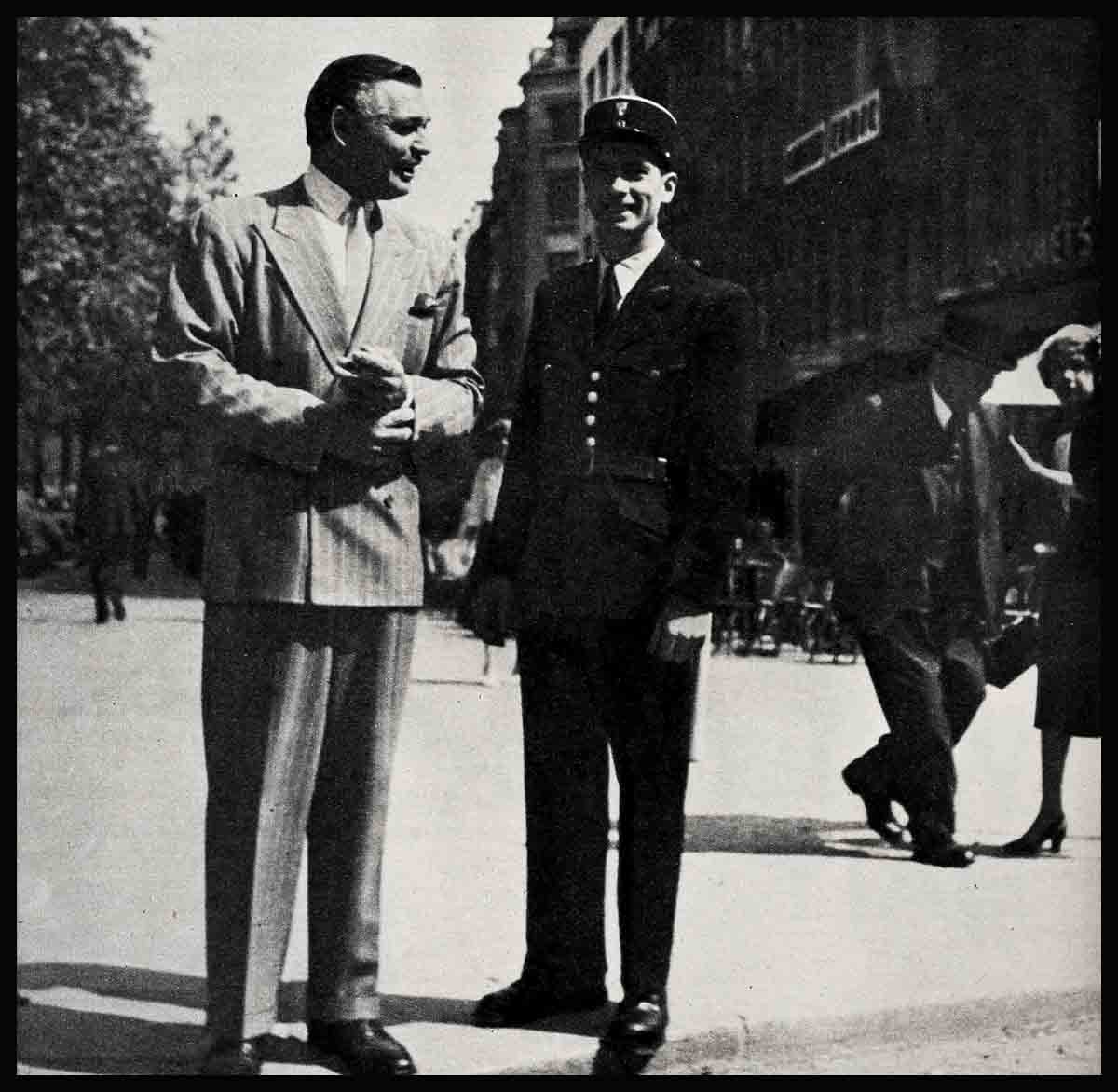
Anything Goes!
MEET A WORKING STAR in Hollywood and you find a serious person intent on business, a person who goes to bed early and arises early, a person who is probably annoyed at practical jokes and pranks. But meet a star vacationing in Europe and you discover a person who’s freed himself from cares for a while, and is bent on adventure and gayety. The stars turn up at odd times, doing strange things. Whenever I think of them turning up in strange places I recall an escapade of Danny Kaye’s in Manchester, England.
Ambition never leaves some people alone. No matter how successful they are, there always seems to be one more thing they yearn to do. And ‘it’s usually in some field other than their own.
With Danny Kaye, the urge—for years—has been o be a ballet, dancer. During his recent fabulous engagement at the London Palladium, he decided to do something about it. He had become friendly with one of the leading dancers in a ballet company then touring the provinces. And Danny’s powers of persuasion being what they are, he convinced the dancer a) to teach him the routine for one of the numbers, and b) to allow Danny to step in for him at a performance in Manchester one night.
But they kept it all a deep dark secret—even from the ballerina opposite whom Danny was to dance.
Without warning, she found herself confronted by a strange partner, apparently confident of what he was doing—except for a vaguely self-conscious grin. She rose to the occasion, however, and successfully saw her anonymous partner through the routine.
In the wings, in the meantime, the director was fuming. And after Danny had taken his bows, the director rushed up to the imposter and furiously demanded his name. Danny was suitably meek. “Danny Kaye,” he murmured.
“Danny Kaye!” the director almost exploded. “But this is wonderful!”
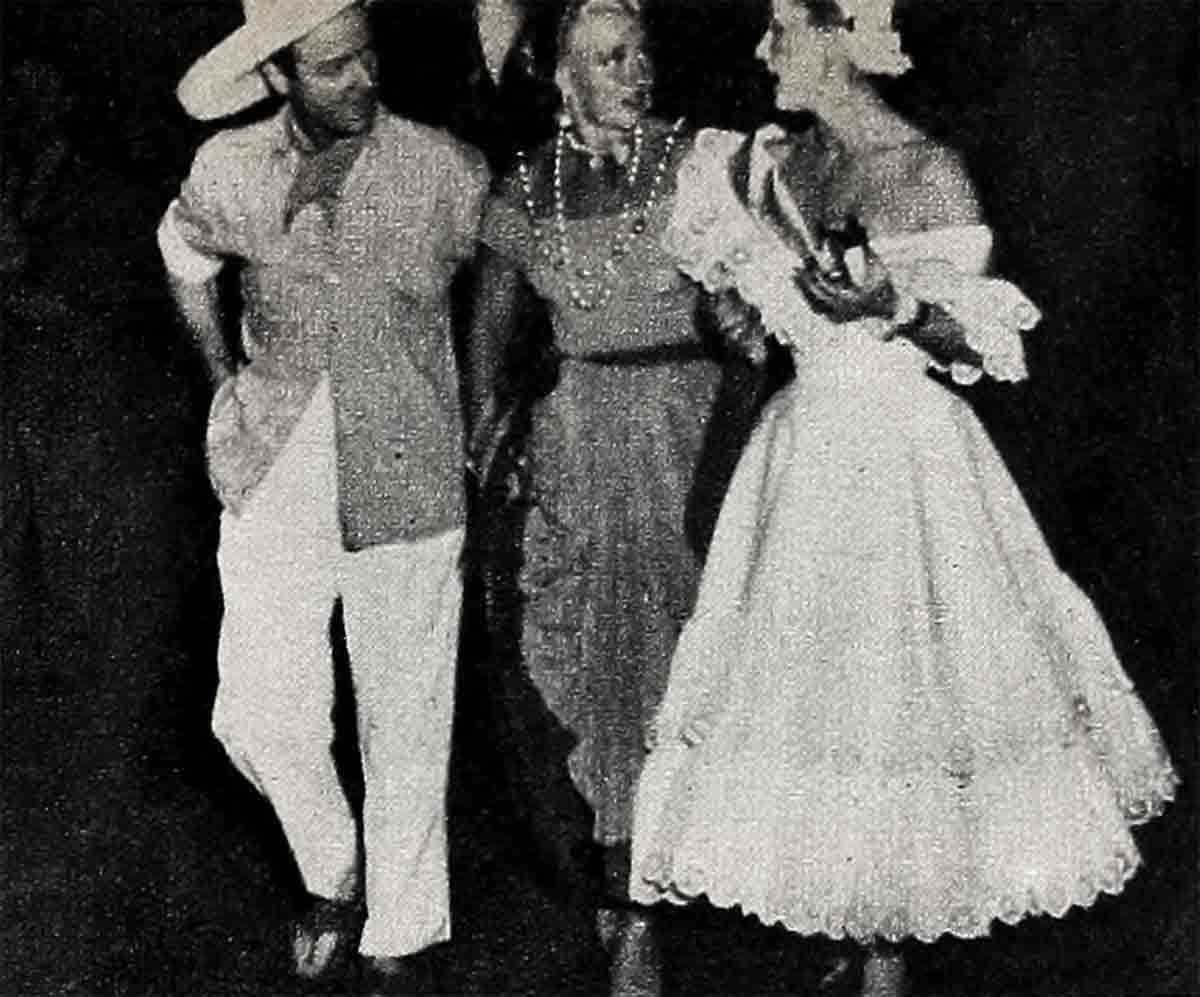
The director did not offer Danny an engagement—although the one-shot ballet dancer is convinced he might have, with just a little encouragement. But Danny couldn’t have done anything about it anyway. He was scheduled to get back to London for a Command Performance before the Royal Family.
Another escapade of a star involved a bit of detective work on my part.
Italian villagers, several years ago, flocked to the tent on the outskirts of town to see the mysterious Cagliostro. Never, rumor whispered, had so mighty a master of legerdemain been seen in Lombardy—certainly not since the Middle Ages. The wonder-worker was a huge, dark-browed man of ferocious aspect for whom animals and flowers appeared and disappeared.
“Maraviglioso,” exclaimed the awestruck patrons.
Next day the tent was gone, and Cagliostro’s shingle was out in another village. Who was the mystery man who appeared from nowhere to bewitch the peasants and their pretty wives as well as to charm the preciouslire from their pockets?
Cagliostro disappeared from the Italian byways as suddenly as he had come, and, perhaps the audiences in the ancient hill-towns are wondering about him yet.
Intrigued with the story, I remembered one remarkable magician I knew. And in Rome, I went straight to him and demanded the truth. I was a good detective. The culprit grinned.
“You see, Elsa, I was broke and I had to see myself through to my next picture. But some of the experiences I had are going to be mighty useful when Greg Ratoff and I get together on the ‘Great Cagliostro.’ . . .” Which they certainly proved to be.
The mighty magician’s name: Orson Welles.
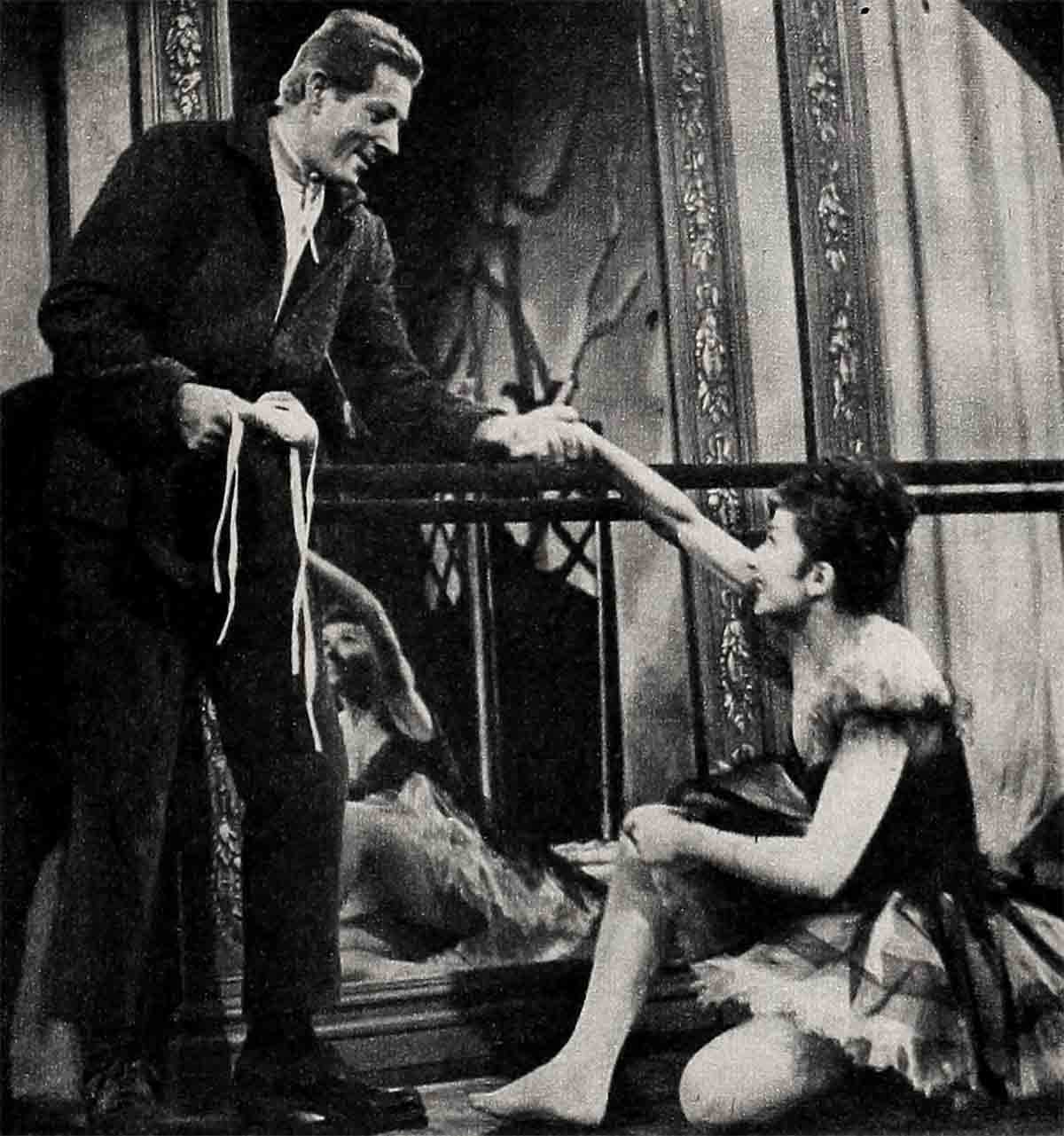
Gene Tierney has been missing from this season’s social flurry in Europe. She’s been abroad, all right, but she has been spending almost all her time in serious pursuits—working on “Never Let Me Go” in London with Clark Gable, and in her spare time, studying ballet dancing.
But last year, she was completely caught up in the social whirl. And one of the biggest events of the year—a costume ball in Venice, found her arriving at the door dressed as a little Italian peasant girl. Her costume was perfect, down to the last detail—a basket of produce which swung over her arm.
One look at her, and the doorman sent her around to the servants’ entrance. For a moment, Gene wanted to protest. But then she decided to relax—and just see what happened. Next thing, she was in the kitchens of the Palazzo.
She was busily making friends with the staff, when one of the guests who had seen her herded off, made his way back to rescue her. Gene should have been grateful—but she wasn’t.
“I was having such a wonderful time,” she said.
Also “having a wonderful time” is Errol Flynn. On location in the English countryside, where he is filming “Master of Ballantrae,” Errol has been trying to behave like a “perfect English gentleman”—no practical jokes, no bizarre clothes, no displays of temperament. He’s rented a beauful home in suburban London pending he arrival of Patrice and has admitted to being “too tired’ from shooting to raise cain at the night clubs.
The only deviation from this new approach to life happened when bit player, Jane Harte, complained of being “warm enough to take a shower with my clothes on.” Before she knew what hit her, Errol had picked her up and tossed her into a nearby shower stall and turned the water on full force.
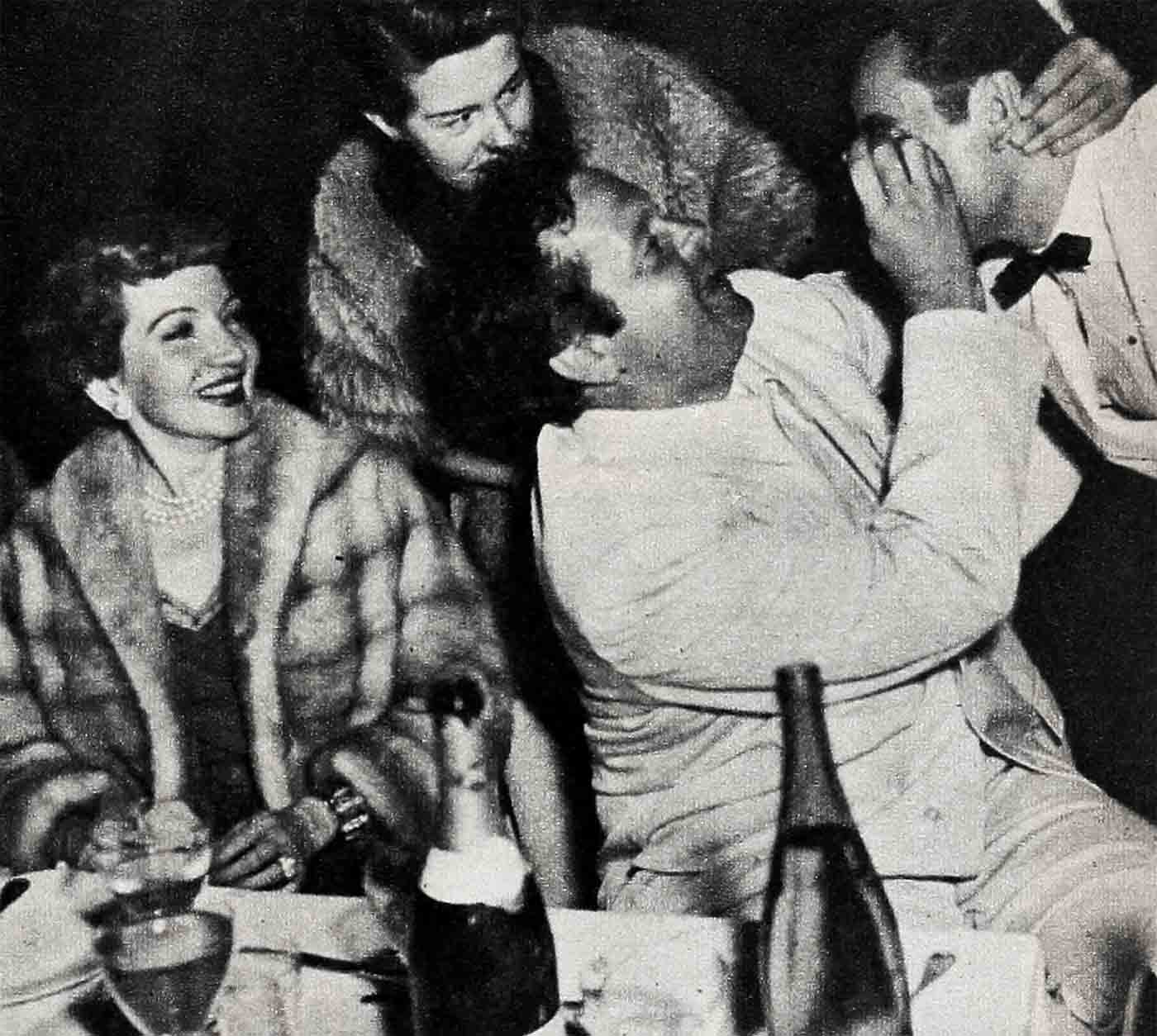
Clark Gable was accessory—rather than instigator in a little adventure last summer. It was the height of the holiday season in Cornwall when Clark arrived on location for M-G-M’s “Never Let Me Go.” In the hundreds-of-years-old town of Mevagissey, Clark was working on an outdoor set surrounded at respectful distances by adoring holiday-makers. Those with cameras would come hesitantly up between shots to take a candid picture of their idol and were given full cooperation.
One day he noticed a middle-aged man standing at the edge of the crowd, camera in hand, just watching. Hour after hour, the man didn’t budge. Finally as the sun was setting, and the unit was packing up for the night, he approached slowly, purple in the face with terror.
“Begging your pardon Mr. Gable, can I take your picture?”
“Well, sure,” Clark agreed, grinning his famous grin. “But why did you wait all day?”
“To tell you the truth, I didn’t want to be here at all. It was my wife started this,” he explained. “She made me get up early this morning—it’s my day off from the quarry—and go out and buy a camera. She said, ‘Don’t come back till you’ve got Gable’s picture.’ It’s past my tea now and I don’t mind telling you I’m hungry!”
So the willing model posed for the reluctant photographer.
One of the best bull fights I’ve ever seen was in a villa at Biarritz.
It happened this way. About thirty of us had met for lunch in the home of a dear old friend of mine who lives near the Spanish border. Our plan was to go to San Sebastian afterwards, to see the bull fights. But just as we were getting ready to leave, a terribly heavy storm broke out, and that was the end of our plans. We looked forward to a pretty grim afternoon, with the rain pelting at the windows and lightning flashing all around us.
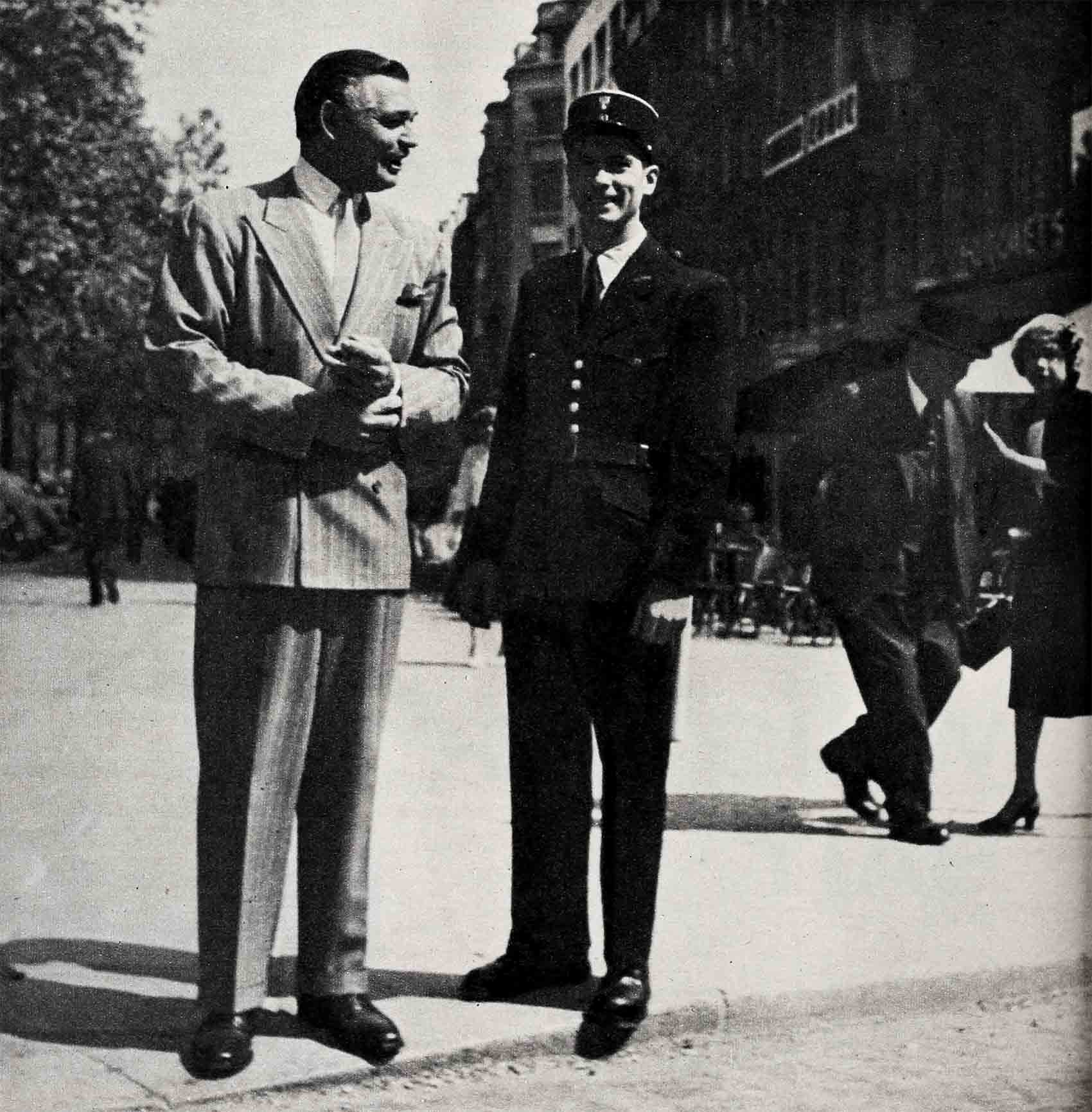
Suddenly, down the stairs swept a matador—waving a red velvet drape in front of him. In his hands, he held two long toasting forks. He paused dramatically. “You wanted a bull fight. Here you are!”
For the next hour, Charlie Chaplin proved to our little group just how well he deserves his reputation as the greatest mimic in the world. He was the bull, he was the picador, he was the matador. And he was sensational.
As a fitting climax to the performance—after he had, as the matador, successfully slain himself, as the bull, he transformed himself into thousands of cheering Spaniards and exited shouting, “Olé, Olé!”
British stars—for all you hear of their so-called dignity and restraint—are just as likely as our home-grown variety to let themselves go and have a little fun when they get away from home. The famous Bea Lillie didn’t even bother to get very far away.
After years of star billings, she thought it would be fun to see how it felt to work as an unknown music hall entertainer again. So calling herself Miss Brown, she applied to the manager of a variety house in a seaside resort not far from London. She didn’t try very hard to sell herself on talent. Her appeal was emotional: she was broke, and she was hungry—and well, yes—she could do some fairly decent imitations of Bea Lillie.
“Let’s see,” said the sympathetic manager. Bea ran through a slightly exaggerated burlesque of herself. “Well,” said the manager, “I’ve seen better. But it’s not bad.” And he hired her for a week at thirty quid—about seventy-five dollars.
For seven days, she worked a two-a-day schedule that had the audiences rolling in the aisles—a Beatrice Lillie cavalcade. The manager was impressed—but business being business—he didn’t let her know how much, except to offer her a slight raise, “If, Miss Brown, you’d care to stay on.”
She rejected the offer, with an apology. “Oh, I’d like to, very much,” she said, “but I can’t. You see, I start another engagement tomorrow—at £1,000 a week. That’s what I usually earn when I work under my own name—Bea Lillie.”
Turning her back on the home fires has pretty much the same effect on Ginger Rogers that it has on a lot of girls on holiday: kindling romantic fires!
Ginger, much in evidence at the Riviera gay spots last summer, was seen a great deal with one Monsieur Jacques Bergerac, a prominent Paris lawyer. And while at this writing Ginger wouldn’t commit herself beyond the fact that she was “loving France,” the talk hereabouts is that, unlike the sad, long-nosed Bergerac (first name, Cyrano) of literature, who lost the girl of his dreams, the suave, elegant Bergerac (first name, Jacques) of contemporary history is very likely to wind up with his dream girl permanently in his arms.
So, there’s a chance that at least one far-from-home escapade will shape up into a serious hearthside matter.
THE END
It is a quote. PHOTOPLAY MAGAZINE NOVEMBER 1952




